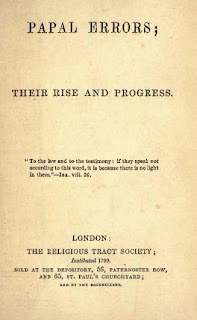DURING the last three months of the year 1850, the people of England in general have perhaps heard and said more about the Pope and Popery
than during the whole previous course of their ives. The attention of many has been drawn to a subject on which they had before scarcely be
stowed a thought.That " England, in common with other nations of Europe, was formerly under the dominion of the Pope, or bishop of Rome that, about three hun dred years ago, a great change took place, called the Reformation that those who left the church of Rome were called Protestants that the early promoters of this change endured much persecu
tion, and that many of them were cruelly put to death for their religion but that, after several struggles, England was quietly settled in the possession of religious liberty and that most of the people embraced Protestantism in one or other of its forms ;" this is the full extent of knowledge
possessed by many thousands of the British people, on the subject of Popery and Protestantism. Many take it as a matter of course that, living in Protestant England, they are themselves Protestants, though altogether careless about religion; and many more, though really concerned about religion themselves, and desirous of extending it to others, have never been led to ask what Popery is. They
have thought of Popery if they have thought at all as a thing of by-gone days the concern of a former age, but not in any way capable of affecting them or their children. In some places, during the last few years, curiosity has been awakened by the erection of buildings for Roman Catholic worship, or by the visible establishment of Roman Catholic societies. Perhaps some degree of alarm has been excited by the fact of such societies having been joined by persons from other religious bodies. But the feeling has not been very deep or very general. Of late, however, circumstances have transpired to convince us that, whether or not we are in earnest in our Protestantism, the Pope is in earnest in his Popery. Well aware that his predecessors long held sway over the people of England, and believing, with too much reason, that some persons in the present day are half inclined to take upon them the yoke of bondage which their forefathers had shaken off", the Pope has ventured upon a bold stroke. Assuming the right, if he could but obtain the power, to exercise over us the authority which Rome formerly possessed, he has mapped out our country, and appointed to every part of it religious instructors of his own choosing, authorizing and commanding them to teach and govern all the people of England according to the rules and orders of the Church of Rome. The announcement of this vigorous measure, and the pompous and triumphant manner in which it has been proclaimed, have come upon the nation like a thunder-clap, or like the assault of midnight robbers. People are roused from their quiet slum
bers, and starting to consciousness, are inquiring concerning this step of the Pope, whether it is, or, according to their several views, asserting that it is, or is not, a matter of real consequence an in sult to our queen an infringement of the laws of our country an interference with established institutions an attack on our civil and religious liberties. Not a few are now led to ask What is Popery ? Is it old or new true or false good or bad ? Is it a matter that concerns only those who profess it as their chosen religion ? or have we any duty to discharge, any interest to pursue, in promoting or resisting its spread among us ? These, and many such, are the questions of persons who really wish for information, yet who have not the means or the inclination to study laboured controversy, nor to make themselves familiar with the voluminous details of history. For such persons this little volume is designed. In preparing it, may th writer be enabled to speak the truth in love ; and
may it be rendered useful to the reader as the means of assisting him to form his own judgment, and inducing him to cleave more closely than ever to that blessed book which "has God for its author, salvation for its end, and truth without anymixture of error for its subject !"
260 Pages
DOWNLOAD
Pretplati se na:
Objavi komentare (Atom)

Nema komentara:
Objavi komentar